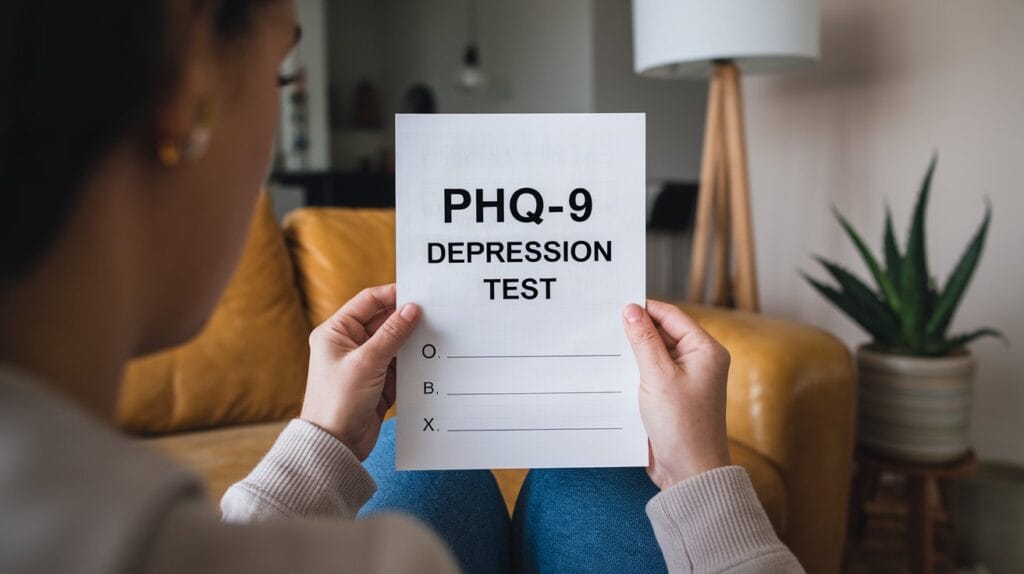Are You Feeling Depressed? Find Out Now – Take PHQ-9 Test

Ever feel overwhelmed by a persistent sadness that you can’t quite explain? If you’ve been feeling consistently down or if that sadness is interfering with your daily life, it may be a sign that you’re experiencing depression. Depression is a widespread mental health condition affecting millions worldwide. In fact, lifetime prevalence estimates suggest that nearly one in five people will experience a depressive episode, highlighting the urgent need for mental health awareness and intervention.
Depression influences your emotions, thought processes, and everyday activities like sleeping, eating, and working. While occasional sadness is a normal part of life, clinical depression is a persistent state that can profoundly disrupt daily functioning. By monitoring your mood with tools like the PHQ-9, you empower yourself to take early action, whether that means adjusting your self-care routine or seeking support, to pave the way for a more balanced, fulfilling life.
What is the PHQ-9 Test?
The PHQ-9 (Patient Health Questionnaire-9) is a quick, self-administered questionnaire used to screen for signs of depression. It consists of 9 questions that align with the diagnostic criteria for depressive disorders, making it a useful first step in understanding your emotional health.
What is Depression?
Depression is a common mental health condition that affects your mood, energy, and overall outlook on life. It can make everyday activities seem overwhelming and often leads to feelings of sadness and hopelessness. For more in-depth information about depression, visit our page on Depression.
Who Should Take the PHQ-9 Self-Assessment?
This test is for anyone who wants to check in on their mental well-being—especially if you’ve noticed:
- A persistent low mood or lack of motivation
- Changes in your sleep or appetite
- Feelings of stress or overwhelming sadness
It’s a great tool for anyone curious about their mental health or experiencing symptoms that might suggest depression.
How Can the PHQ-9 Self-Assessment Help You?
Taking the PHQ-9 test offers several valuable benefits for your mental well-being:
- Early Detection: It helps pinpoint depressive symptoms early, enabling you to seek support before things worsen.
- Self-Awareness: Reflecting on your responses can increase your understanding of your emotional state and overall mental health.
- Monitoring Progress: If you’re already in treatment, regularly taking the test allows you to track improvements or identify areas of concern.
- Facilitating Communication: Your results can serve as a helpful starting point for discussions with healthcare providers, ensuring you receive the most appropriate care.
Instructions for Taking the PHQ-9 Self-Assessment
- Find a Quiet Space: Make sure you’re in a comfortable, distraction-free environment.
- Answer Honestly: Reflect on your feelings over the past two weeks and answer each question with care.
- Review Your Answers: Take a moment to look over your responses.
- Consider Professional Advice: If your responses suggest moderate to severe symptoms, it might be time to consult a professional.
PHQ-9 Test for Depression
Disclaimer
Please note: The PHQ-9 self-assessment is a tool for self-reflection only, it is not a substitute for a professional diagnosis. Only a qualified healthcare provider can diagnose depression or any other mental health condition.
Need Help?
If you feel you need further assistance or support, consider reaching out to a professional. Find a Therapist Here.
Credits
The PHQ-9 test was originally developed by Drs. Robert L. Spitzer, Janet B.W. Williams, and Kurt Kroenke, with support from Pfizer.
Frequently Asked Questions (FAQs)
1. What is the PHQ-9 test used for?
The PHQ-9 is used to screen for signs of depression and to monitor the severity of depressive symptoms over time.
2. How often should I take the PHQ-9 self-assessment?
It’s a good idea to take the test periodically—especially if you notice changes in your mood. However, consult with a healthcare professional for personalized advice.
3. Can the PHQ-9 diagnose depression?
No, the PHQ-9 is solely a self-assessment tool. It is not a diagnostic instrument, and a formal diagnosis should only be made by a qualified professional.
4. Who developed the PHQ-9 test?
The PHQ-9 was developed by Drs. Robert L. Spitzer, Janet B.W. Williams, and Kurt Kroenke, with the support of Pfizer.
5. Where can I find more information about depression and mental health?
For more resources on depression and mental health, visit trusted websites, consult healthcare providers, or explore additional content on our site.
